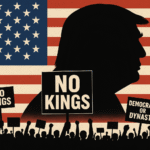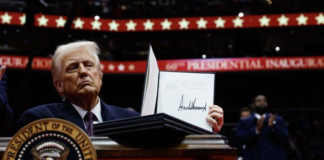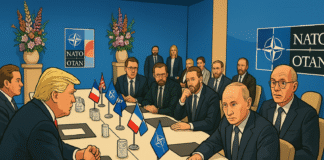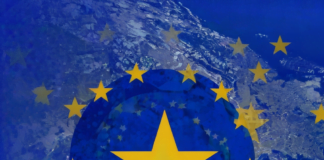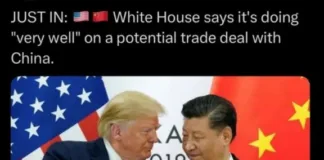|
Getting your Trinity Audio player ready...
|
Munich Security Conference Highlights Growing Rift Between U.S. and Europe
The recent Munich Security Conference was marked by a sense of shock and urgency among European officials, who are now scrambling to respond to the Trump administration’s latest moves on Ukraine, Russia, and European defense.
Concerns Over a U.S.-Russia Peace Deal
One of the biggest fears among European leaders is that President Donald Trump may strike a peace deal with Russian President Vladimir Putin that could undermine both Ukraine and broader European security. These concerns were amplified by U.S. Vice President JD Vance’s speech, which barely touched on Ukraine or European defense and instead criticized Europe on issues like free speech and migration.
Adding to the unease, Trump’s special envoy to Ukraine, retired Lieutenant General Keith Kellogg, declared that European nations would not be directly involved in peace talks—though their perspectives would be considered. Further fueling European concerns, reports emerged that U.S. and Russian officials will soon meet in Saudi Arabia to begin negotiations on ending the war.
While U.S. officials have assured allies that they seek a “durable” peace and that Ukraine will be included in discussions, some European leaders fear a repeat of past appeasement policies. European foreign policy chief Kaja Kallas, referencing the infamous 1938 Munich Agreement, asked, “Have we been here before?” Polish Prime Minister Donald Tusk echoed similar concerns on social media, writing, “MUNICH. NEVER AGAIN.”
Europe Under Pressure to Take Charge of Its Own Defense
The conference also underscored a harsh reality for Europe: it may no longer be able to count on the U.S. for military protection. European leaders are now facing increased pressure to ramp up defense spending, accelerate arms production, and establish independent security guarantees for Ukraine. A hastily arranged summit in Paris on Monday will address these urgent issues.
The Trump administration’s stance on NATO has only added to the uncertainty. U.S. Defense Secretary Pete Hegseth recently stated that a Ukraine peace deal would not include NATO membership and that expecting Ukraine to reclaim its pre-2014 borders was unrealistic. He also emphasized that the U.S. would not prioritize European security over its broader strategic interests.
Trump himself has further upended Western policy by openly engaging with Putin. After a recent phone call with the Russian leader, Trump described the conversation in positive terms and announced that peace talks would begin immediately. This abrupt shift contradicts years of efforts by the Biden administration and European allies to isolate Putin and only negotiate from a position of Ukrainian strength.
Europeans Scramble for a Response
Many of Trump’s latest moves were telegraphed during his election campaign, echoing positions from his first term, when he repeatedly criticized NATO and accused European nations of not investing enough in their own defense. Yet, despite these warnings, European leaders now find themselves playing catch-up.
After months of debating potential security guarantees for Ukraine, they are now under direct U.S. pressure to provide concrete plans. In response, two European leaders have called for the European Union to appoint a special envoy for Ukraine peace talks—several months after Trump named his own.
However, European officials remain divided. Some, after private discussions with U.S. diplomats, believe the Trump administration has a more structured approach behind closed doors than its public rhetoric suggests. Others worry that the U.S. is not merely diverging from European policies but is actively working against the European political mainstream.
These concerns intensified when Vice President Vance recently met with leaders of Germany’s far-right Alternative for Germany (AfD) party, a group shunned by mainstream European politicians. One European diplomat warned, “It is clear now that the U.S. wants to break the post-World War Two order that they created. And that includes destroying the EU. We will have to be prepared for that and change our attitude completely.”
With the future of transatlantic relations in question, Europe faces a defining moment: whether it can unify, strengthen its own defense capabilities, and chart an independent path—or risk being sidelined in the unfolding global power shift.
- No Kings: Millions of Americans March Against Trump’s “Authoritarian Rule”Spread the love Historic Protests Sweep Across America In what analysts are calling one of the largest coordinated protests in… Read more: No Kings: Millions of Americans March Against Trump’s “Authoritarian Rule”
- Millions of Americans March Against “King Trump” – The ‘No Kings’ Movement Sweeps the NationMillions of Americans join the “No Kings” protests, challenging Donald Trump’s alleged authoritarianism and calling for the defense of U.S. democracy. A historic movement is reshaping the nation’s political future.
- Bitcoin vs. Fiat: Musk Draws a Clear LineSpread the love In mid-October 2025, Elon Musk reentered the crypto conversation in force, drawing a stark distinction between Bitcoin and… Read more: Bitcoin vs. Fiat: Musk Draws a Clear Line
- Britain’s Multiculturalism: Hypocrisy in Domestic PolicySpread the love A British politician recently declared: > “I don’t want us to become a multicultural country where different people… Read more: Britain’s Multiculturalism: Hypocrisy in Domestic Policy
- Pakistan’s Bitcoin Moment: What a Minister’s Sign at the UN Really MeansSpread the love When a government minister casually holds up a hand-written “BITCOIN” sign at the United Nations, it’s more than… Read more: Pakistan’s Bitcoin Moment: What a Minister’s Sign at the UN Really Means


